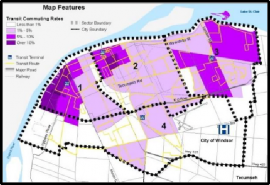The importance of great transit for everyone - in Transit Windsor's words
Transit Windsor describes the importance of environmentally sustainable public transit:
- "Societal values have shifted towards living in communities that are both environmentally sustainable...and healthy (i.e. encourage physical activity and which minimize pollution) ...there is also now definitive evidence that communities are healthier and "greener" when they have great transit service...
- ...strategic plans that made sense for the future when written in 2006 may no longer reflect how the community has evolved in the last decade."
- -- More Than Transit, page 5
It also acknowledges a desire to break barriers to public transit usage:
- "A bus coming less frequently than every 20 minutes can add a lot of time to an individual's trip if they miss their connection or are a couple minutes late.
- This makes taking transit very inconvenient and undesirable for someone who has access to other transportation alternatives."
- -- More Than Transit, page 6
Yet this is not addressed for trips to the single site acute care hospital. It strongly suggests that access to the new hospital by public transit is not a high priority.

The Way Forward (the existing 2006 transit master plan), devotes several pages to identifying Transit Windsor's core market of "immigrants, seniors, students, low-income individuals, and people with physical and/or cognitive disabilities".
A series of maps shows where these residents are likely to live. The map above shows transit commuting rates across Windsor (the "H" marks the proposed exurban hospital site adjacent to Windsor Airport).
It's particularly helpful for understanding the extreme physical distance to the rural CR42 single site acute care hospital for those who are most dependent on public transit.
The city's demographics have not changed dramatically since 2006.
A Costly Proposition: Flaws in Transit Windsor's New Master Plan Citizens for an Accountable Mega-hospital Planning Process